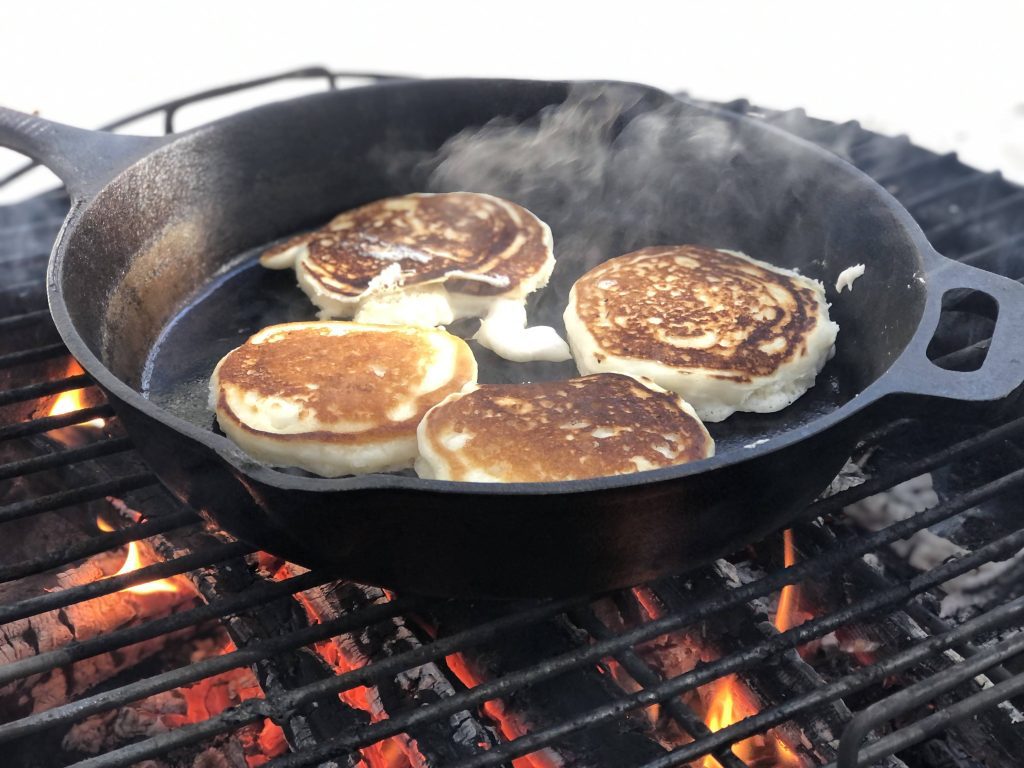
It is a Thursday evening in November, 2020 and I am staring at my weekly planner incredulously. How in the world was I going to prepare for multiple assignments and an exam next week, visit with my fiancé for the two days she’s in town, and make travel arrangements for my next clinical rotation all in one weekend?! I could feel the ball of stress begin to rise in my stomach, and my heartbeat accelerate as my anxiety increased. This feeling was becoming all too familiar for me as an occupational therapy doctoral student in the first full semester during a pandemic. I was overwhelmed and feeling quite alone. Tears welled up in my eyes.
But then, as had often happened in these situations before, I thought about pancakes. Not just any pancakes, but one specific batch of pancakes I made on a snowy morning at summer camp in the mountains of Colorado years ago. Smiling at the memory, I wiped my eyes, took 10 deep breaths, and got to work. I emailed my therapist and asked for an emergency meeting the next day to address my feelings surrounding the situation. I created a to-do list for each day of the weekend so I could make progress on my assignments and studying. I texted my fiancé and gently told her that I would appreciate time to work in the mornings, but that we would have plenty of time in the afternoons and evenings.
That weekend went smoothly – I completed my to-do lists, spent uninterrupted quality time with my fiancé, and processed the stress with my therapist. I started in what felt like an impossibly overwhelming and isolating position that Thursday night, and yet I turned that situation into one of productivity and social connection. Why was I able to accomplish this? And what in the world do pancakes have to do with it??
Well, the story about pancakes isn’t about the pancakes at all, really. It is a memory that reminds me of what I know about myself and what I’m capable of. It is a memory that paints a picture of my self-identity.
See, this morning at summer camp when I was eleven years old, I walked out of my tent to find 6 inches of snow on the ground in May. I felt frozen (literally and figuratively) and overwhelmed. My young brain had minimal experience with outdoor living, learning, or playing, and I had a hard time believing that “summer camp” could go on with snow! I was also very aware that I was part of a group of campers responsible for cooking breakfast that day and I was completely at a loss for how that was supposed to happen with snow everywhere – cooking outside was odd enough, much less with snow!
Luckily, I was surrounded by a camp counselor and a couple of children that were able to set the tone for me about that morning: they suggested we all have hot chocolate to mark the special occasion, that we use the snow as an ingredient in our pancakes, and that we all go on a group scavenger hunt for the big pancake pan as it was buried in snow somewhere. Once I got a taste of the fun and creativity that could be had in this new and unfamiliar situation, I leaned into it. I put on a show for the other children as I skipped across the snow-covered grounds searching for supplies or gathering snow. I asked for help and learned how to light a gas stove. I worked with a team of children to problem solve a small heat source for a very LARGE pan on a cold morning. I came up with a pretend cooking show to make light of the array of burnt and undercooked pancakes that morning. And boy, did we have a blast!
Obviously, this is a poignant memory for me, one that I draw strength and resolve from. What about this pancake-cooking adventure made it so formative? Why do I go here when I need a reminder of who I am and what I can do?
Well, the outdoor environment played a huge role in this story – we couldn’t control the weather or the setting of the pancake mission, so I learned that I had to (and was very capable of) adapting to unfamiliar circumstances. Natural settings don’t allow you to shy away from the changing elements, and they don’t provide a person or action to blame for your discomfort. Sure, you can be disappointed or grumpy at the weather or landscape, but the weather won’t change because of your tears and feelings. It is much more efficient and pleasant to work with your surroundings and choose to accept the circumstances, changing yourself and your perspective on the situation. I learned I could choose to layer up and run through a beautiful landscape gathering snow for my pancake mix instead of shivering in a tent wishing to go home.
Additionally, the social influence surrounding me in this snowy moment of uncertainty was crucial to my learning and success. When I couldn’t fathom cooking breakfast in the snow, my camp counselor announced casually that breakfast crew needed to get going. His calmness about the situation sent me the message that 1) cooking breakfast that morning was indeed possible, and 2) I might be able to act calmly as well; the anxiety in my stomach was potentially unnecessary.
Maybe more important than the counselor, I also had the ability to take cues from older children: one suggested that we should have hot chocolate to celebrate the special occasion, another enlisted my help in clearing the stove for cooking and taught me how to light the burner. Their calm and positive attitudes, as well as their ability to teach me as a peer was very impactful in my perception of how successful this pancake-making activity was. My self-esteem went through the roof!
And finally, I was able to feel myself step into a role where I could set the tone for other children (younger or just more uncomfortable than myself): I could be entertainment, a role model, and comfort for these children with my silliness and creativity. When I decided to poke fun at the burnt pancakes we were making, I noticed some younger, quieter kids smile for the first time that morning. This gave me a sudden sense of purpose, and I kept the bit going. Eventually, all of us cooks were narrating an entire cooking show around the process, with loud exclamations, exaggerated pancake flips, and terrible fake accents. Onlooking kids that had been shivering in the corner of the kitchen tent were now huddled in close and howling with laughter. I felt effective and at home in this role I created for myself.
Those snowy-day pancakes in middle of the woods with a group of kids turned a lightbulb on for me – I discovered that I am a strong woman, with a good sense of humor, a resilient body, an appreciation for beautiful things, a team player, and a morale booster. I can rely on others and they can rely on me. That lightbulb still shines today and has helped me get through tough days in graduate school, difficult moments in my outdoor pursuits, hard interactions with friends and family, disappointment or failure, and successes or victories too. I know my worth and that I can handle anything with the tools I accumulated that day and on the adventures it inspired in future years.
When children come to play at TimberNook, they are exposed to the same conditions I encountered on my pancake morning. They are subjected to the elements and mixed-age peer influence. Therefore, they have so much opportunity for a “lightbulb”, self-identity moment of their own. In fact, I would argue it is what children gravitate toward at TimberNook, why they ask to come back. They may have many of these experiences each time they come!
TimberNook allows for a child to find her self-identity through trial and error; she can have moments (maybe many) where she feels uncertain, anxious, or overwhelmed. She may freeze, watch from afar, cry. But then an older boy might giggle at the same situation and ask for help in solving the problem. The girl hesitates, but then follows him and gives a hand. Suddenly she is laughing and singing while she works to help the group. The rest of the children join in the song, and she feels an overwhelming sense of importance.
That little girl might go home after TimberNook that day and say, “I cried today…but we sang lots of songs!” She most likely will not be able to say, “Today I was overwhelmed by a task until an older child set a positive example for me and gave me a meaningful role. After that I trusted my abilities and contributed humor and a song to bond over which made the task more fun! I learned about who I am, what I can do, and how much I can handle when I play outside with my friends. I will use that knowledge for years to come.”
Well, don’t worry that she can’t handle that mouthful yet. I was once that little girl, and I’m here to spread the word: TimberNook equips children with the self-knowledge, self-esteem, self-efficacy, self-concept, and social roles they need to handle the future lows and highs that life will inevitably bring. In other words, TimberNook and its lessons in self-identity are invaluable. Without identity after all, who are we when it snows on our pancake plans?
